On return, Dzhuzupbekov secures gold at Ulaanbaatar Open 2025
Thursday, May 29, 2025 - 18:08 By Vinay Siwach

ULAANBAATAR, Mongolia (May 29) -- Paris Olympic bronze medalist Uzur DZHUZUPBEKOV (KGZ) looked rusty on his return to competition since winning the medal in August 2024. But he had enough experience to win gold medal at the Ulaanbaatar Open 2025, his first competition since.
"This was my first start after the Olympics," Dzhuzupekov said. "It was very difficult, to be honest. It was quite tough to wrestle here, especially since the climate is different."
In his three bouts at 97kg, Dzhuzupbekov struggled for conditioning. He opened the day with a 10-6 win over Gankhuyag GANBAATAR (MGL) before beating Bat-Erdene BYAMBASUREN (MGL) 9-1. But it was his last match against Asian bronze medalist NITESH (IND) which troubled him the most.
Dzhuzupekov began the match with an arm-throw for four but Nitesh scored a reversal to make it 5-1 and the Indian the scored a turn to close the gap to 5-3 at the break. On resumption, Dzhuzupbekov held his position and was only called passive with just over a minute left.
Nitesh, now trailing 5-4, needed a turn to turn the match in his favor but he failed to score any and Dzhuzupbekov defended the one-point lead to win the gold medal at 97kg.
"It's dry here, and we're at an altitude of about 1,400 meters," he said. "That made it really challenging. It was hard for the whole team to compete. But overall, I’m happy with the result. Starting with the very first match it was really tough, I couldn't breathe properly here. We’ll analyze things and keep preparing."
Dzhuzupbekov has been off since winning bronze in Paris and got married after the Olympics. But as one of three medalists for Kyrgyzstan's Greco team, Dzhuzupbekov is now hoping to build on that result.
"I’ll be preparing for the World Championships," he said. "But I think there will be another tournament after this one — probably in Hungary or Poland. And we’ll likely prepare differently for that. Overall, I think the team spirit is good right now. I don’t focus too much on any one opponent, because the competition is very strong. Especially with all the Europeans — they’re all big and strong. I think I just have to be ready, be in good shape. I try not to overthink who I’ll wrestle or how the match will go. I just believe that if I’m in good form, I’ll win."
Dzhuzupbekov's gold was one of the three Kyrgyzstan won on day one of the tournament which doesn't award team title as it is not a championships.
Asian Championships silver medalist and Muhamet Malo Ranking Series gold medalist Razzak BEISHEKEEV (KGZ) defeated Murat FIRAT (TUR) in Round 2 bout and won the gold medal at 67kg.
Firat got the first par terre advantage in the first period but he failed to score and just before the break, Beishekeev surprised him with a headlock throw for four to lead 4-1. In the second period, Beishekeev got the par terre but he did not score and was happy to defend his 5-1 lead and win.
World U23 champion Asan ZHANYSHOV (KGZ) won the gold medal at 87kg after won his bouts with dominance. He defeated Batbayar TSOGTBAATAR (MGL), 8-0, and Karan KAMBOJ (IND), 9-0, to finish at the top.
Alperen BERBER (TUR) was also entered but he pulled out injured after suffering a hamstring injury in his first bout against Karan KAMBOJ (IND).
Another Turkiye wrestler who pulled out injured was Burhan AKBUDAK (TUR). He suffered an infection in his elbow day before coming to Mongolia and did not wrestle a single bout. Since only three wrestlers were entered at 82kg, Akbudak still managed to win gold.
But the gold medal was historic. Shahin BADAGHI (QAT) became the first wrestler from Qatar to win gold medal at any international event in Greco-Roman.
Badaghi, an Iranian transfer to Qatar, defeated PRINCE (IND) 9-0 in the only bout the two wrestled in the day. Badaghi scored a takedown and then a suplex for a 6-0 lead. India lost a challenge to make it 7-0 before Badaghi scored a takedown to finish the bout via technical superiority.
Ahmet YILMAZ (TUR) gave Turkiye its lone gold medal after beating Yryskeldi MAKSATBEK UULU (KGZ) in the 77kg final, 5-1. In the earlier Nelson bracket bout, Yilmaz defeated the Kyrgyzstan wrestler 11-3.
Iran and India also won gold medals as Asian champion Danial SOHRABI (IRI) put on a show to win four of his bouts and the gold medal at 72kg.
For India, Anil MOR (IND) won the gold medal at 55kg after he pinned Ulan MURATBEK UULU (KGZ) in the evening session. In his four bouts, Mor gave only two points, against Muratbek Uulu, but pinned him to remain one of the most dominant wrestler of the day.
The 19-year-old was wrestling his first senior international tournament and hails from Bass village, Hisar district in Haryana. He trains at the Guru Mehar Singh Akhada in Rohtak which has always given wrestlers to the Indian team.
For his Round 5 bout against Muratbek Uuku, Mor decided to defend more than attack.
"I had watched his bouts and he was trying to do the underhook and then throw you for the fall," Mor said. "I never gave my arm to him for the drag to underhook."
Though he was given passive in the first period, Mor knew that he has to get out of the par terre position quickly. He did so by sneaking out of Muratbek Uulu's gold and then scoring a takedown.
Instead of going for the turns, Mor held Muratbek Uulu to the mat and then secured the fall to get his first-ever senior medal internationally.
RESULTS
55kg
GOLD: Anil MOR (IND)
SILVER: Ulan MURATBEK UULU (KGZ)
BRONZE: Davaabandi MUNKH ERDENE (MGL)
67kg
GOLD: Razzak BEISHEKEEV (KGZ)
SILVER: Murat FIRAT (TUR)
BRONZE: NEERAJ (IND)
72kg
GOLD: Danial SOHRABI (IRI)
SILVER: Mustafa SAHIN (TUR)
BRONZE: Yryskeldi KHAMZAEV (KGZ)
77kg
GOLD: Ahmet YILMAZ (TUR) df. Yryskeldi MAKSATBEK UULU (KGZ), 5-1
BRONZE: Nishant PHOGAT (IND) df. Sumiyabazar ZANDANBUD (MGL), 11-0
82kg
GOLD: Shahin BADAGHI (QAT)
SILVER: PRINCE (IND)
BRONZE: Burhan AKBUDAK (TUR)
87kg
GOLD: Asan ZHANYSHOV (KGZ)
SILVER: Batbayar TSOGTBAATAR (MGL)
BRONZE: Karan KAMBOJ (IND)
97kg
GOLD: Uzur DZHUZUPBEKOV (KGZ)
SILVER: NITESH (IND)
BRONZE: Gankhuyag GANBAATAR (MGL)

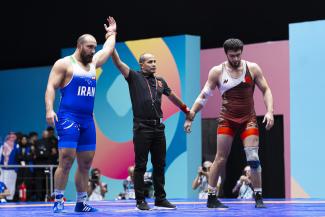
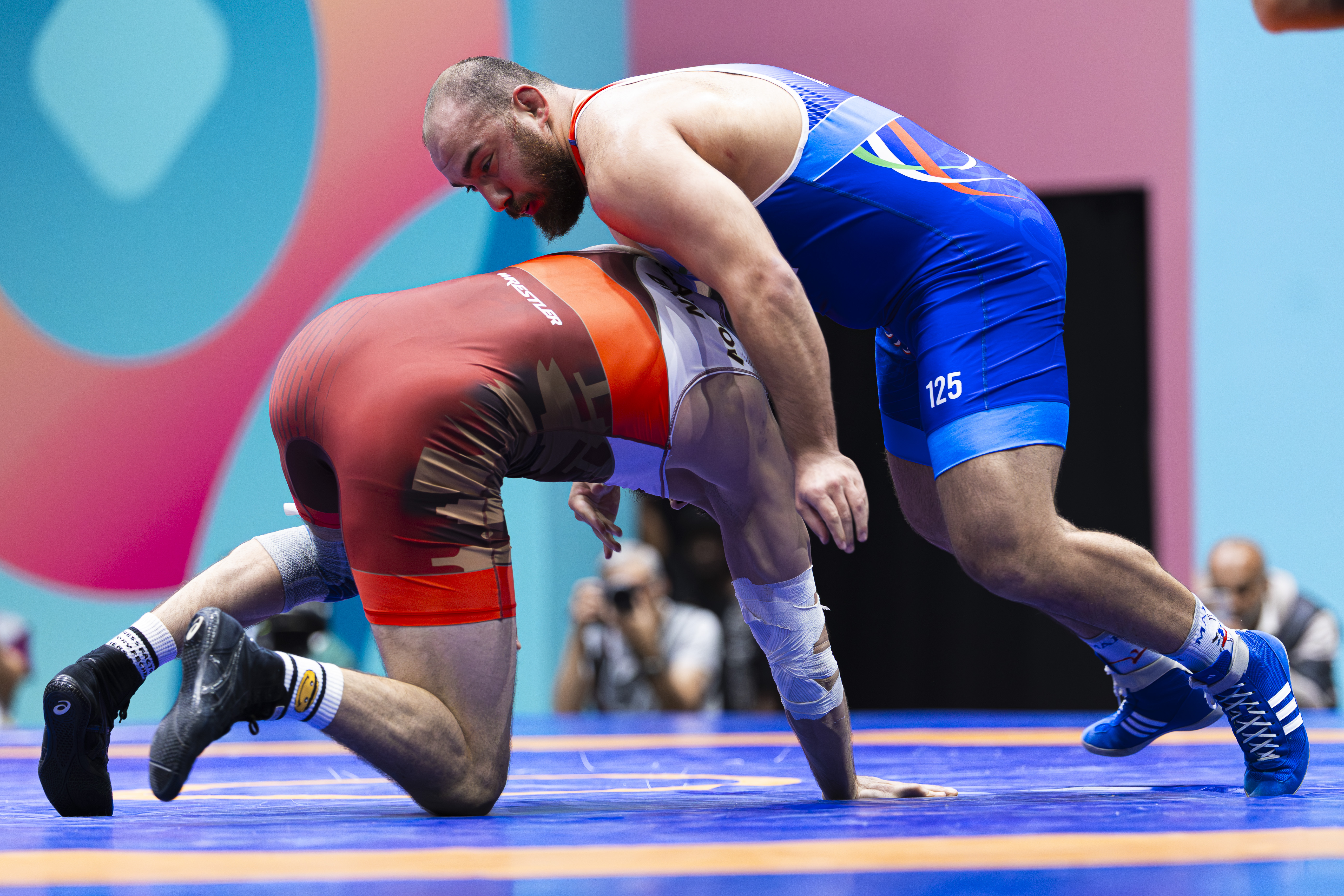 Amir Hossein ZARE (IRI) scores a takedown on Shamil SHARIPOV (BRN) during the 125kg final. (Photo: United World Wrestling / Kadir Caliskan)
Amir Hossein ZARE (IRI) scores a takedown on Shamil SHARIPOV (BRN) during the 125kg final. (Photo: United World Wrestling / Kadir Caliskan)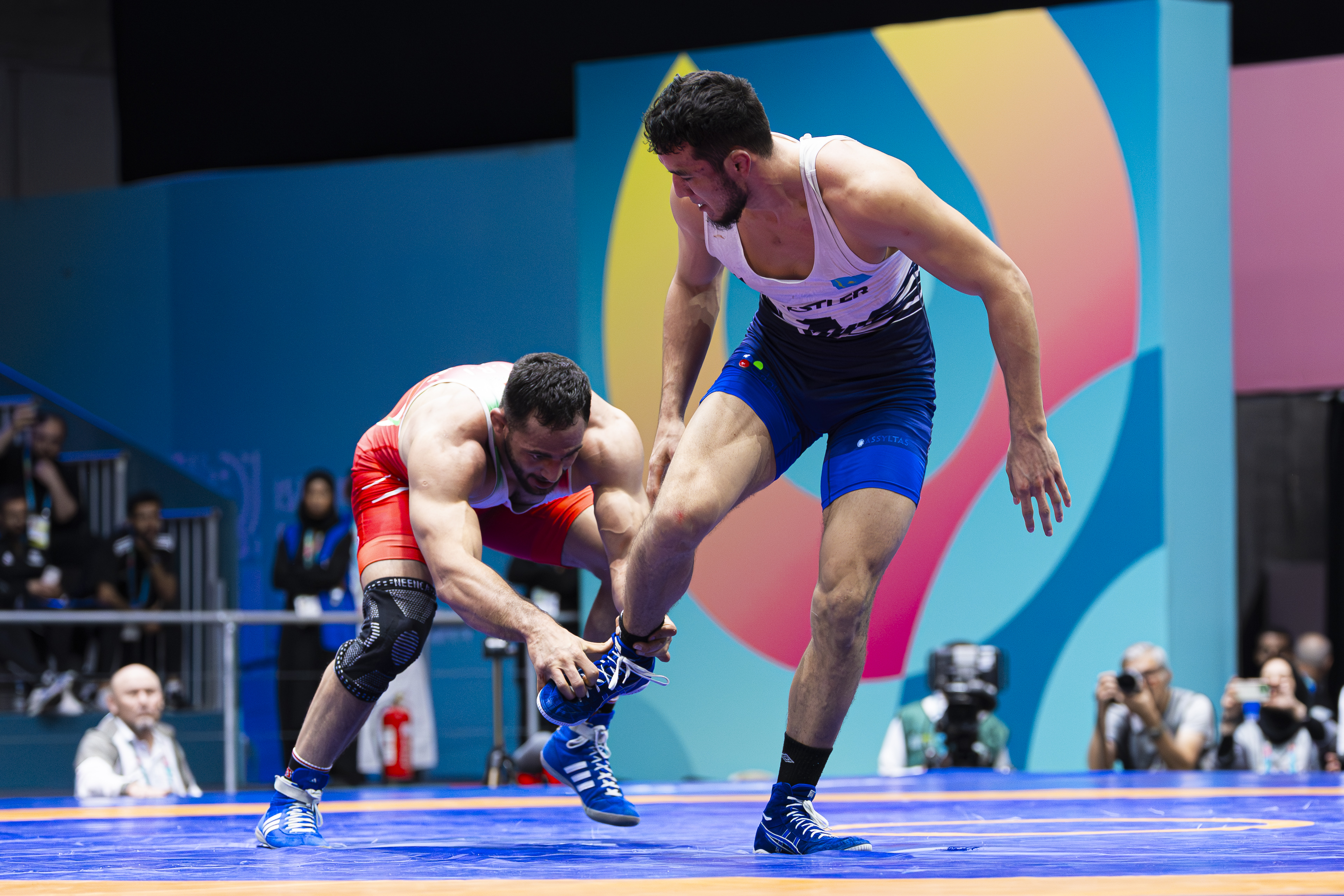 Amirali AZARPIRA (IRI) tries to control Rizabek AITMUKHAN (KAZ) during the 97kg final. (Photo: United World Wrestling / Kadir Caliskan)
Amirali AZARPIRA (IRI) tries to control Rizabek AITMUKHAN (KAZ) during the 97kg final. (Photo: United World Wrestling / Kadir Caliskan)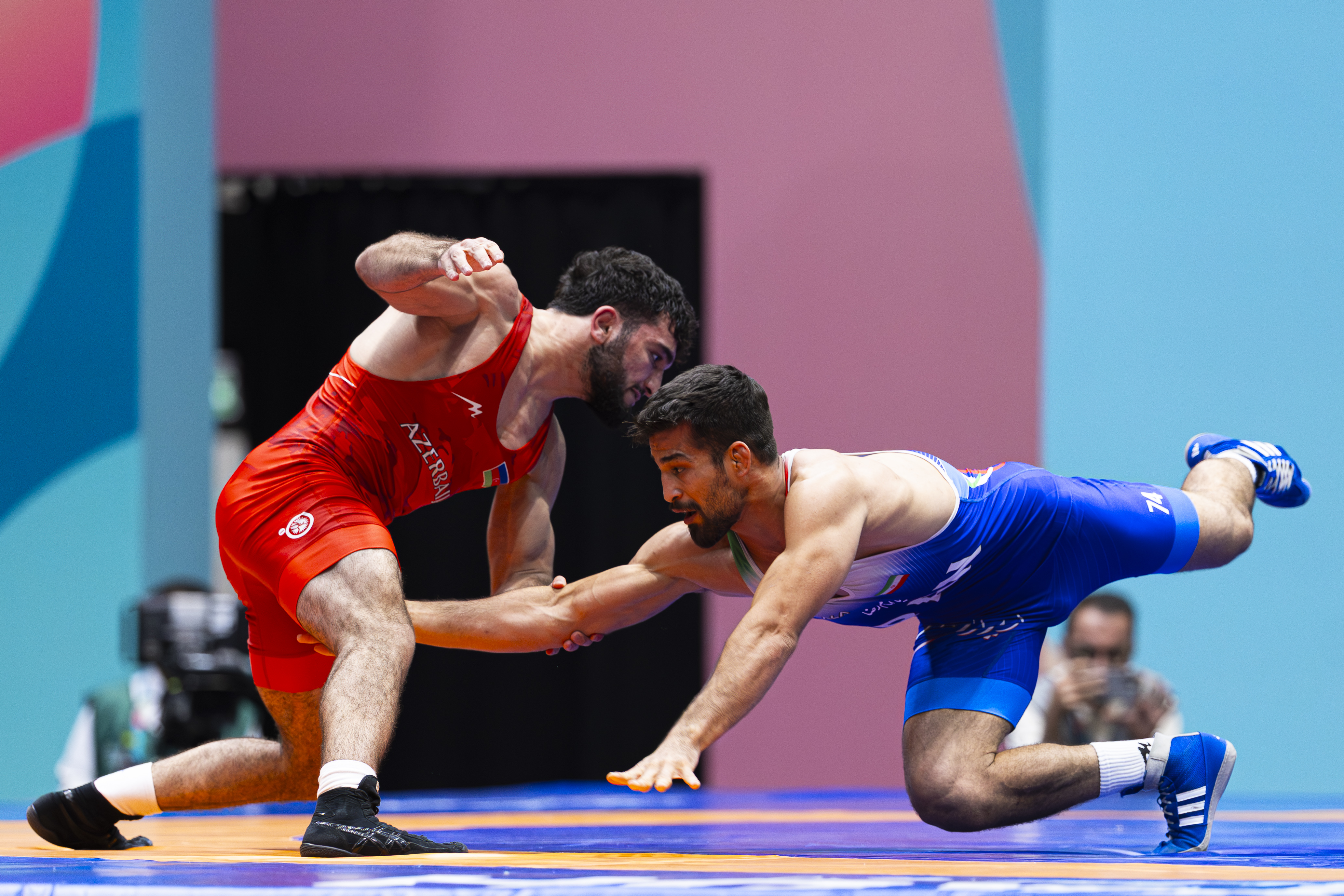 Younes EMAMI (IRI) reaches for the leg of Aghanazar NOVRUZOV (AZE) during the 74kg final. (Photo: United World Wrestling / Kadir Caliskan)
Younes EMAMI (IRI) reaches for the leg of Aghanazar NOVRUZOV (AZE) during the 74kg final. (Photo: United World Wrestling / Kadir Caliskan)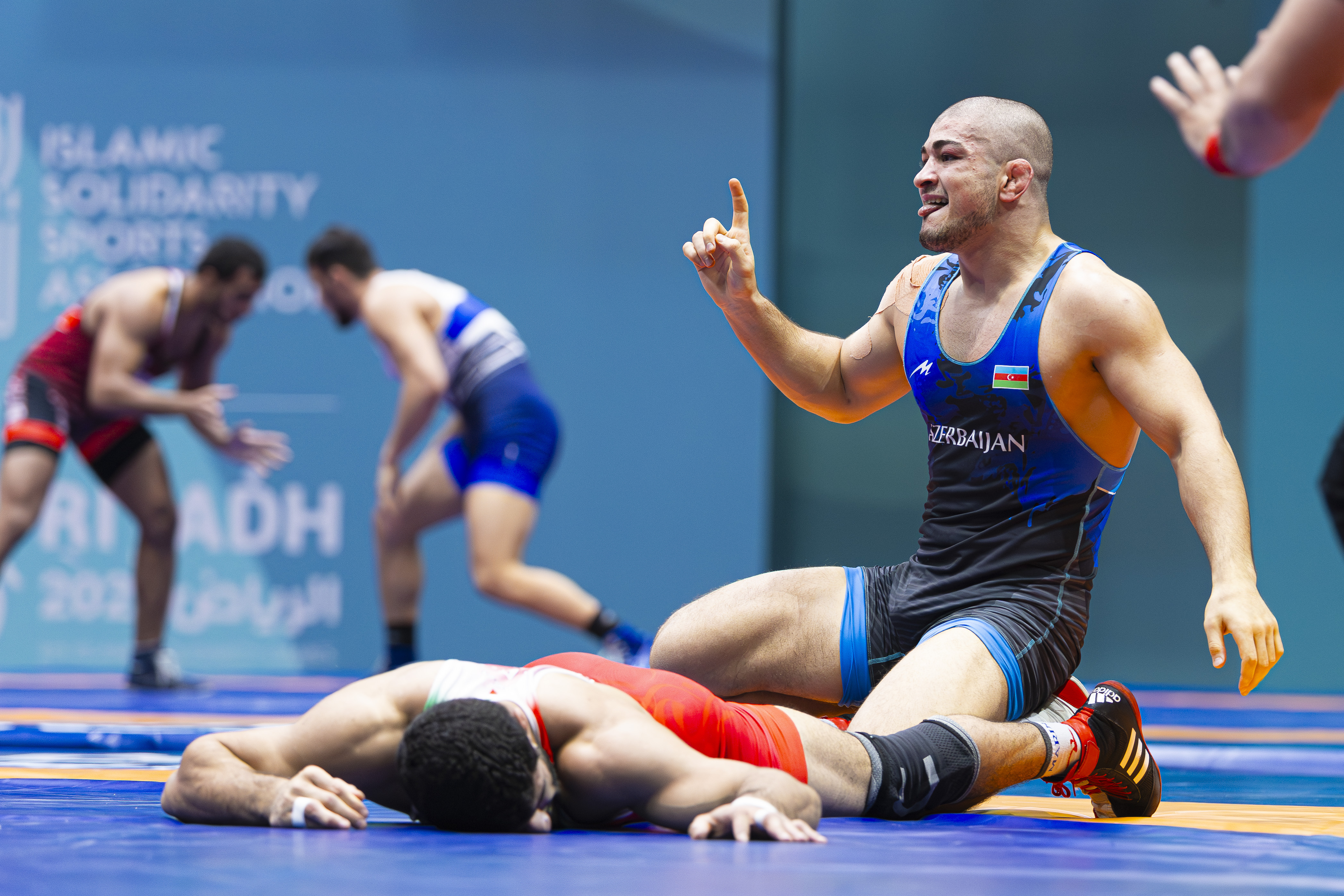 Arsenii DZHIOEV (AZE) celebrates after beating Kamran GHASEMPOUR (IRI) in their opening bout at 86kg. (Photo: United World Wrestling / Kadir Caliskan)
Arsenii DZHIOEV (AZE) celebrates after beating Kamran GHASEMPOUR (IRI) in their opening bout at 86kg. (Photo: United World Wrestling / Kadir Caliskan)
Share your thoughts.
Comments